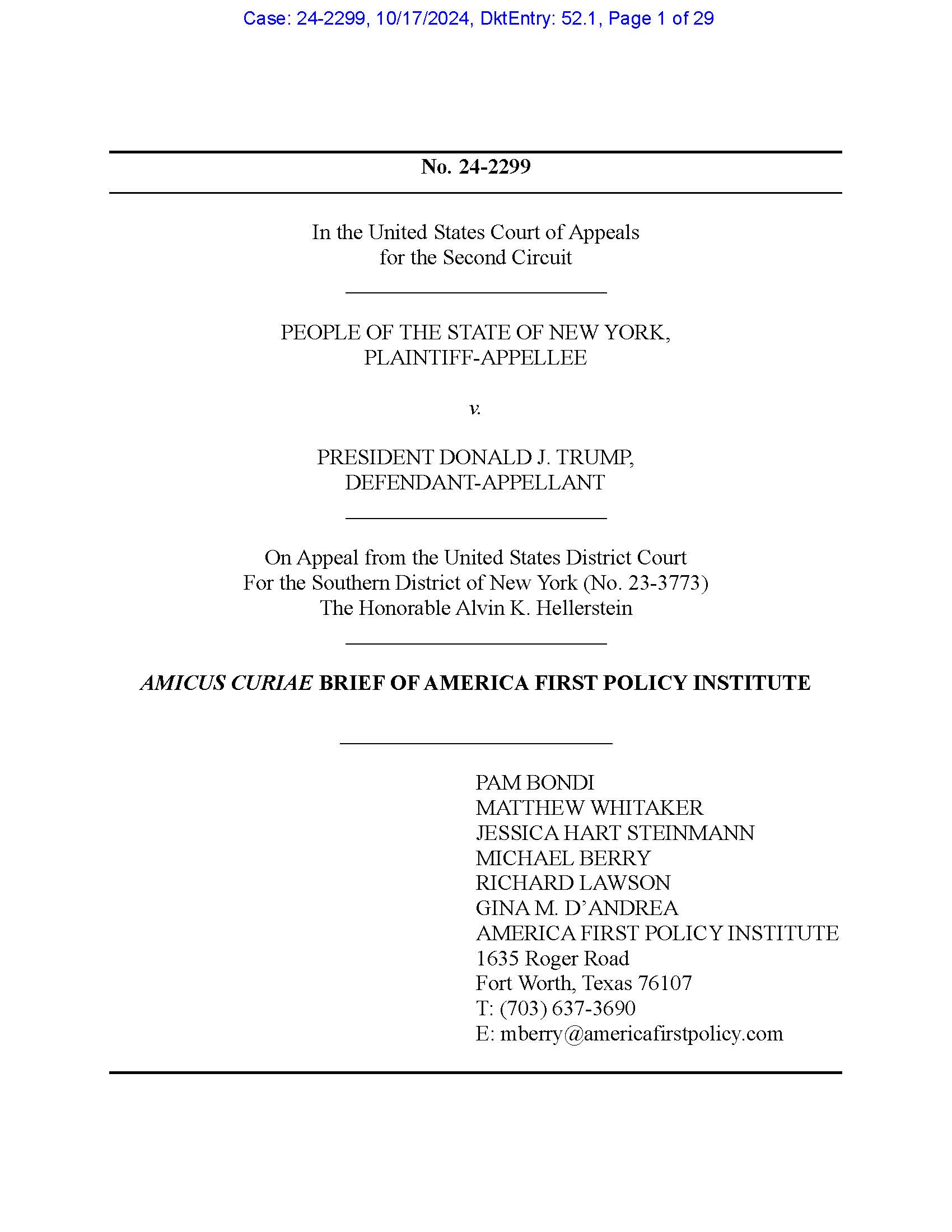People of NY v Trump - AFPI Amicus on the Merits
IDENTITY AND INTEREST OF AMICUS CURIAE
America First Policy Institute (“AFPI”) is a 501(c)(3) non-profit, non-partisan research institute dedicated to advancing policies that put the American people first. Its guiding principles are liberty, free enterprise, the rule of law, America-first foreign policy, and a belief that American workers, families, and communities are the key to our country’s success.
AFPI’s leadership includes many former leaders of the United States government.AFPI’s leaders and members alike appreciate that bedrock principles of separation of powers, enshrined in the Nation’s constitutional design from its birth, produce critical checks on government power while promoting accountability to the American people.
AFPI believes that the court below erred when it summarily remanded Defendant-Appellant’s Second Notice of Removal without holding an evidentiary hearing. Congress intended removal for federal officials to be broadly construed to prevent state interference with federal operations and to ensure federal officials can vindicate their interests before a federal court. Proper consideration of the federal issues raised by Defendant-Appellant—presidential immunity doctrine and preemption—would have established good cause for removal. AFPI submits this amicus in support of a Defendant-Appellant’s arguments that removal was warranted based on the important federal interests before the Court.
INTRODUCTION
When a federal official’s actions in their official capacity are the subject, either in whole or part, of a legal action, the official may seek to remove the case against them to the corresponding federal court. 28 U.S.C. § 1442 (the “Federal Official Removal Statute”). For criminal proceedings, a federal defendant must file a notice of removal in both the state and district court within thirty (30) days after the state court arraignment. 28 U.S.C. § 1455(b)(1). A federal defendant may file such notice of removal after the thirty-day deadline “for good cause shown.” Id. The district court judge reviewing such notice of removal is authorized to grant summary remand to the state court only where it can be determined from the face of the notice that removal is improper. 28 U.S.C. § 1455(b)(4). In all other cases, the district court should hold a prompt evidentiary hearing to determine the merits of the removal request. 28 U.S.C. § 1455(b)(5). Where removal is granted, the state court proceedings are halted. Id.
In the present case, the court below denied Defendant-Appellant’s Second Notice of Removal. App. 7a-70a. That decision does not comport with the requirements of the Federal Official Removal Statute and ignores the important federal issues raised by Defendant-Appellant.
Defendant-Appellant sought removal to vindicate important federal interests that arose during and after the conclusion of his state court trial. Instead of conducting a proper evidentiary hearing on those issues—the doctrine of presidential immunity, the Supremacy Clause, the Sixth Amendment, and the First Amendment—the District Court summarily rejected removal based on a flawed rationale that failed to consider these important intervening events. The refusal of the court below to grant removal deprived Defendant-Appellant of the right to have those federal issues adjudicated by a federal court. Accordingly, this Court should reverse the remand order issued by the court below and grant immediate removal of this case.
